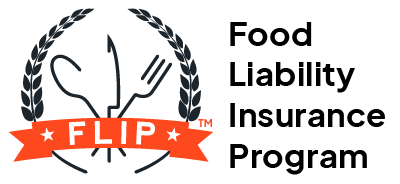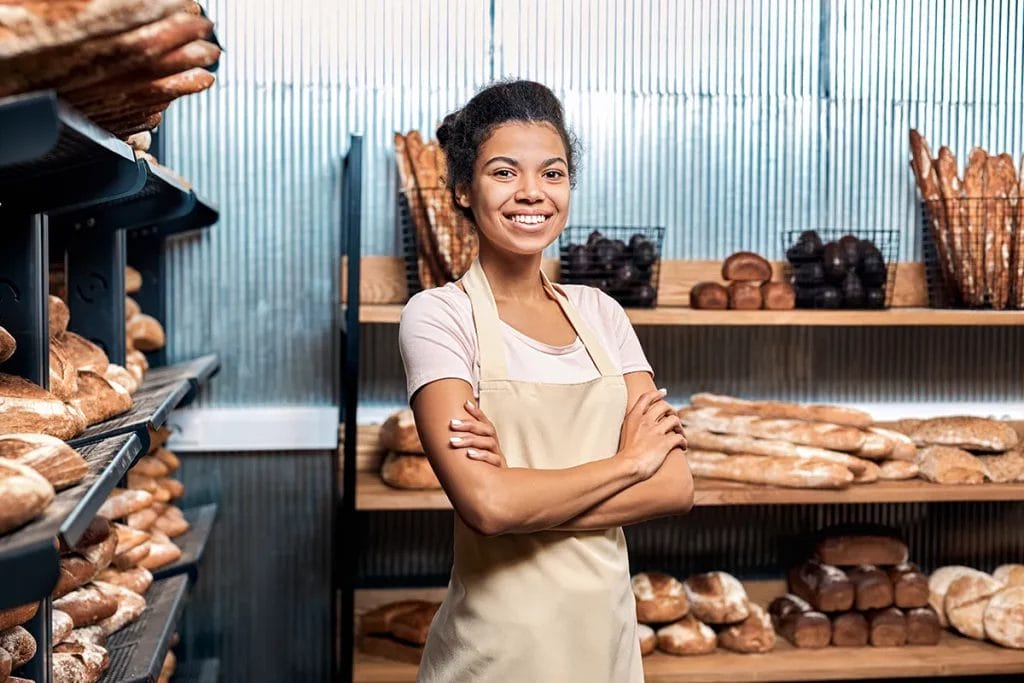A lot goes into running a successful food business, from knowing your niche to offering stellar customer service. And no matter how well things are going, smart business owners keep their eyes on the horizon, searching for new opportunities to grow and evolve their operations.
If you’re doing just that, you’ve come to the right place. Whether you’re just starting out in the culinary world and are planning ahead or you’re ready to take that next step, here are over a dozen awesome food business ideas to consider.
1. Create a Loyalty Program
Most of us have probably belonged to at least one loyalty program at some point in our lives, whether it was grocery store rewards or frequent flyer miles. That’s because rewards programs are known to increase sales by building loyalty among your existing customers, as well as attracting new ones.
There are several types of loyalty programs, including:
- Tiered: Different rewards levels based on the amount customers spend or how often they buy from you. The higher tiers can unlock discounts or exclusive rewards.
- Point-based: Points are awarded for every purchase made and later redeemed for freebies, discounts, etc.
- Visit-based: Customers are rewarded for the number of transactions they make, such as receiving a free item after their 10th purchase. Punch cards are a popular way to implement this type of reward.
- Referrals: Customers who refer other people to your business get an exclusive reward when that person makes a purchase.
Key Takeaway: Creating a rewards program is one of the most profitable food business ideas because it can boost your sales by fostering customer loyalty. Choose between using a tiered, point-based, visit-based, or referral system — whichever is best for your business.
2. Develop Your Own App
Creating your own app is one of the most innovative ideas for a food business. Your app can have many different features, but here are some that your customers might expect:
- Online ordering
- Loyalty program
- Menu
- Push notifications
Unless you’re experienced in app design and development, it’s a good idea to hire someone to build your app for you. When you’re hiring a developer, look for someone who has experience building apps for food businesses.
If you’re on a tighter budget, you can do it yourself with an app builder like Appy Pie, BuildFire, or GloriaFood.
And of course, don’t forget cyber liability insurance to protect you from paying out of pocket if your customers’ sensitive info is compromised in a data breach or similar cyber attack.
Key Takeaway: Creating an app for your business makes it more convenient for customers to order online, access their loyalty rewards, view your menu, and stay up-to-date with other happenings.
3. Host Cooking Classes or Workshops

Offering cooking classes is a great way to leverage your expertise to create an additional revenue stream. If people already love what you’re serving up, there’s a good chance they’d be eager to learn from you — teaching classes could be a great food business idea to run with.
Here are just a few ideas for what kinds of classes you can run:
- In-person: Whether you have a kitchen large enough to host a class or a commissary kitchen you rent, in-person workshops are a great way to give hands-on instruction to small groups.
- Virtual: Reach a broader audience and teach more students than you’d be able to instruct in person by using a platform like Zoom to host cooking classes online.
- Pre-recorded: Record cooking tutorials people can purchase and watch at their own convenience — a flexible option for both you and your students!
- Themed series: Create a series of classes focused on a theme like healthy eating or one-pan recipes. Let people sign up for the entire series or individual classes.
If you choose to offer classes, make sure you have professional liability coverage. This insurance is designed to financially shield you if a client sues you over bad advice or accuses you of negligence because you mistakenly forgot an important instruction.
Key Takeaway: Teaching cooking classes or workshops, whether in-person, virtually, or with pre-recorded videos, can be a great way to connect with your community and build awareness of your business while sharing your expertise with others.
4. Manufacture Your Food Products
Do you have your own hit hot sauce that customers keep asking to buy? Are folks constantly telling you they wish they could buy your ice cream at their local grocery store? Then manufacturing your own food products might be a good way to grow your business!
Think Chick-fil-A’s signature sauce, Red Robin’s onion rings, or California Pizza Kitchen’s frozen pizzas. Many restaurants have capitalized on the popularity of specific menu items and now manufacture and sell them in grocery stores around the country.
Here’s what this typically involves:
- Refining your recipe for mass production, such as making it shelf-stable
- Meeting regulatory requirements, including those set by the Food and Drug Administration (FDA) and your state
- Sourcing ingredients and packaging from suppliers who can provide the quantity you need
- Finding a manufacturing facility, like a co-packer, or renting a commercial kitchen for in-house production
- Developing a brand and marketing strategy
- Pricing your products
- Determining distribution channels, such as local retailers, grocery stores, online sales, etc.
If you don’t already have product liability insurance, this is a must before you enter the food manufacturing game!
If someone contracts a foodborne illness from one of your products or chips a tooth on a foreign substance that contaminated an item during production, you could be held responsible. Product liability insurance can shield you from the financial fallout of these incidents.
Key Takeaway: If you have a signature product or menu item that might translate well to being sold in stores, consider manufacturing it! You’ll need to refine your recipe first and make sure to meet legal requirements, but this can open up an additional revenue stream for you.
5. Get Into Online Content Creation

Creating online food-related content can be an excellent way to capture brand awareness and establish yourself as an authority in the culinary industry.
Watching people cook has long been popular (hello, Food Network!), but you don’t need a recording studio to create content.
Platforms like YouTube, Instagram, and TikTok are excellent options if you want to get into video creation. If you’re more of a wordsmith or photographer, Pinterest and blog platforms like WordPress and Medium might be more up your alley.
As for the type of content you create, there are a lot of options to choose from, including:
- Cooking tutorials
- Sharing recipes
- Behind-the-scenes glimpses into running your business
- Educational/storytelling content about the cultural significance of your dishes, what drew you to the culinary world, etc.
- User-generated content from your customers, such as their own recipes or dishes
How do you earn money from this? Many of these platforms let you monetize your content, meaning you’ll be able to host ads on your videos or sell ad spots on your blog.
If you have a large enough following, you may even be approached by sponsors who will pay you to promote their product in your content. For example, a kitchenware brand might pay you to use and talk about their mixing bowls while you prepare a recipe.
Key Takeaway: If you’re tech-savvy (or eager to learn), branching into online content creation can be a fun and lucrative way to grow your business. With monetization and sponsorship opportunities, you can build an additional revenue stream once you’ve gained a following.
6. Add Alcoholic Beverages to Your Menu
Including alcoholic beverages on your menu can expand your offerings and increase your revenue. Many people enjoy having a beer with their burger, for example. If you’re able to offer both from the convenience of your food truck you’ll have a leg up on other businesses that don’t.
There are several factors to consider if you want to serve alcohol:
- Legal requirements: To legally serve alcohol, you’ll need to obtain a liquor license. This can vary depending on your state, county, and/or city, so check in with your alcohol beverage control (ABC) board or similar regulatory agency.
- Compliance with laws: Many states have laws that restrict alcohol sales, including limitations on hours of service and training requirements for your staff.
- What you’ll offer: Beer and wine are standard, but you may also choose to offer one or two signature cocktails as well.
- Staff training: Your employees must undergo state-approved alcohol awareness training to legally serve alcohol.
- Increased risk: Serving alcohol comes with risks, such as accidentally overserving a customer or providing alcohol to a minor. If you have general liability insurance, alcohol-related incidents won’t be covered, making liquor liability insurance a necessity.
Key Takeaway: Including alcohol on your menu can boost your sales and add a fun new element to your business, but it’s important to educate yourself on the risks associated with selling alcohol and to comply with your state and local laws.
7. Host Pop-Up Events With Local Businesses
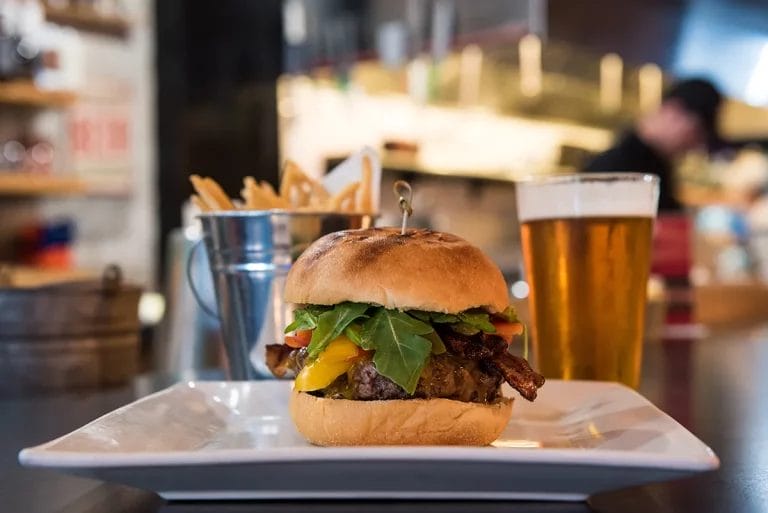
Working with other businesses in your area to host a pop-up event is an awesome way for both you and your fellow entrepreneurs to gain exposure to each other’s audiences.
Let’s look at some of the steps involved in organizing an event like this:
- Pick the right partner: Find a business that complements your own. It shouldn’t be a direct competitor, but it should have a similar audience to yours. For example, if you run a gourmet burger food truck, you might partner with a local brewery.
- Align on goals: You should both agree on what results you hope to achieve from a collaborative pop-up. Discuss how much of an increase in sales you both hope to see and how many attendees you’re aiming for.
- Collaborate on a concept: Decide on a theme together, like “Burgers and Brews.” Develop menu items or pairings that combine both of your specialties, like a dessert that pairs perfectly with your partner’s signature cocktail.
- Logistical planning: Pick a venue, acquire the necessary permits and licenses for an event in your state/county/city, and determine what kind of equipment you can each bring versus what you’ll need to buy or rent.
- Event promotion: Work together on a joint marketing campaign to promote your event, using the social media accounts for each business, email newsletters, and traditional media.
Once the event is over, evaluate its success to determine whether another partnership with this business could be worth your while. Look into metrics like sales data and event attendance and see how they measure up to the goals you both agreed upon.
Include a survey QR code on the back of receipts or post them on signs around the event to get customer feedback.
Key Takeaway: Collaborative pop-ups with other businesses can be mutually beneficial and help you each gain access to each other’s audiences. Make sure to align on goals for the event and measure success afterward to decide if this is something you’d like to do again.
8. Level Up Your Packaging
It’s easy to overlook the importance of your packaging — especially if it just gets discarded after it’s been used. But did you know that 59% of customers say they’ve purchased something again because the packaging was attractive?
Here are two ways you can wow your customers with your packaging:
- Custom branded packaging: Invest in branded packaging that incorporates your brand’s colors and logo to build brand awareness. You can order custom packaging supplies from sites like noissue, PakFactory, and MrTakeOutBags.
- Eco-friendly materials: With 71% of customers making purchasing decisions that hinge on the sustainability of a product’s packaging, it’s smart to go with eco-friendly packaging from companies like Good Start Packaging.
Key Takeaway: Even though it’s disposable, packaging can make a big impact on how customers perceive your brand. Investing in branded packaging and eco-friendly materials can make it more appealing for customers to buy from your business over another.
9. Offer Catering Services
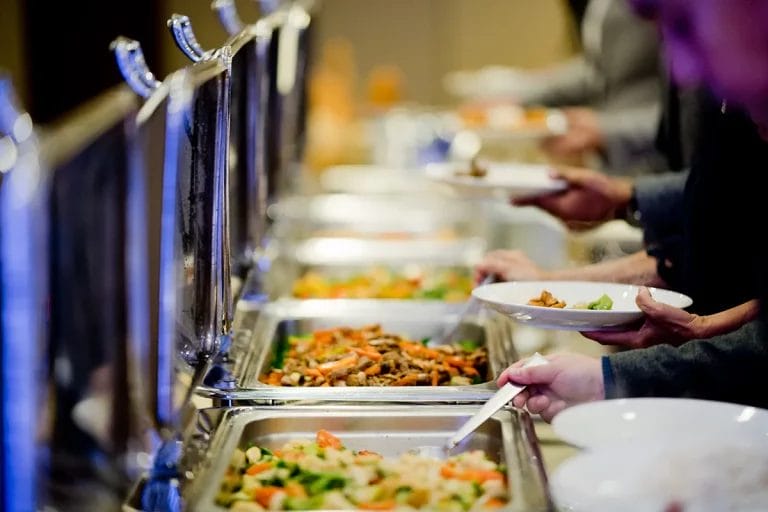
Catering can bring your delicious dishes to customers who may not have tried your foods or beverages before and provide an additional revenue stream for your business.
The steps to starting your catering services include:
- Assessing your capacity for increased food production
- Understanding legal requirements, including special catering licenses
- Protecting your operation with catering insurance
- Developing your catering menu and pricing your packages and services
- Acquiring catering gear, such as insulated carriers, coolers, and chafing dishes
- Hiring and training catering staff
- Creating a booking process on your website with a contract that establishes your services, payment terms, and cancellation policy
Key Takeaway: Adding catering services to your business operations is no small decision, but it can help you reach more customers than you otherwise would (and at their convenience, too!).
10. Expand Your Menu With Plant-Based and Health-Conscious Alternatives
In 2023, 70% of Americans reported eating plant-based foods compared to 66% in 2022. Interest in eating less meat and dairy products is on the rise, so if you don’t already offer vegetarian and/or vegan options on your menu this is a great opportunity to expand your customer base!
While this may mean creating a new dish or two, giving you a chance to exercise your culinary creativity, it can often be as simple as offering plant-based substitutions.
For example, a bubble tea food truck could offer soy, almond, and oat milk. Another common alternative is veggie burgers.
However, making your menu suitable for a wider customer base doesn’t end at plant-based options. Your new dishes or substitution options could also be:
- Gluten-free
- Nut-free
- Soy-free
- Low calorie
- Sugar-free
- Keto
Key Takeaway: With plant-based eating and awareness of different dietary requirements and restrictions on the rise, adding options or substitutions to your menu for these customers can make your business more accessible to a wider range of people than before.
11. Forge Farm-to-Table Partnerships
For years there’s been a push across the country to buy locally grown produce. In fact, 62% of Americans reported making an effort to buy regional food products in 2023.
Partner with local farmers to provide local ingredients for your dishes to enjoy the following benefits for your business:
- Enhanced freshness and food quality
- Community engagement and connectivity
- A boost to your brand identity
- Supply chain stability and less vulnerability to global disruptions or shortages
Key Takeaway: Working with local farmers and food producers is a great way to obtain fresh ingredients and support your community, all while giving you another value proposition to promote to your customers. Plus, local suppliers aren’t as affected by global chain disruptions.
12. Start a Delivery Service
52% of Americans say that ordering delivery or takeout is a crucial part of their lifestyle. By offering delivery, you can increase profits by making it easier for customers to enjoy your food from the comfort of their homes.
How do you grow a food delivery business? Let’s boil it down to just a few steps:
- Decide on a delivery model: You can partner with third-party platforms like DoorDash, Grubhub, and UberEats, hire and train your employees to complete deliveries or use a combination of both.
- Adhere to legal requirements: You may need additional permits or licenses to legally operate this new branch of your business.
- Optimize your menu: Think about which dishes will travel well and which might need to either be modified or left off your delivery menu.
- Invest in packaging: Look for packaging that will protect your food in transit and control temperature as much as possible.
- Promote your delivery service: Use social media and email marketing to spread the news. Offer discounts and promotions for first-time orders to encourage customers to give your new service a try.
- Monitor and evaluate: Collect feedback from customers on your menu, service, and overall experience. Track data like order volume and customer retention to identify potential areas of improvement.
Key Takeaway: The majority of Americans consider food delivery a major part of their lives. By offering delivery, you can meet them where they’re at.
13. Make Meal Kits
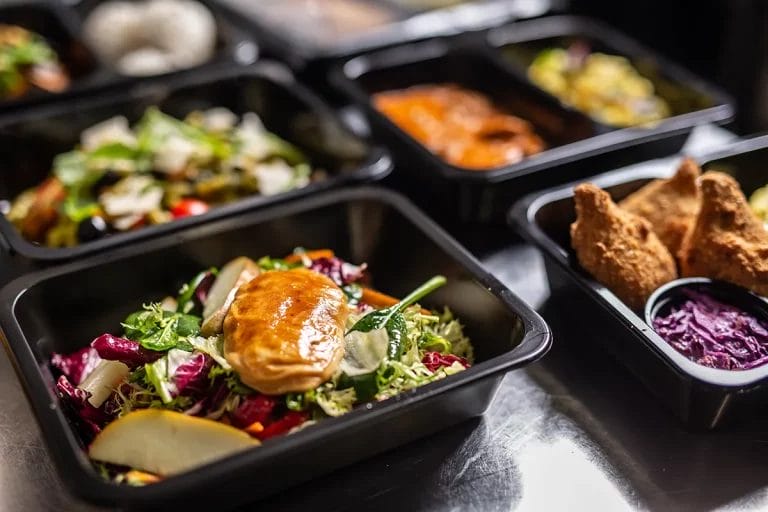
The popularity of meal kits is on the rise, with the industry expected to hit $5.65 billion by the end of 2024 in the U.S. alone. People who subscribe to these services often lack either the time or skills to cook proper meals, so meal kits provide a convenient solution.
While some meal kits contain ingredients and a recipe for the customer to follow, others are ready-made meals that are either refrigerated or frozen and only need to be reheated.
Creating a meal kit service shares a lot of the same steps as delivery, but here are a few additional points to consider:
- Decide what kinds of meals you want to offer customers (healthy, gourmet, vegetarian, etc.) and also whether you want to deliver premade meals or kits that customers cook themselves.
- Source ingredients from suppliers who can provide you with fresh, high-quality foods and seasonings (preferably local suppliers, if possible).
- Assess and adjust your kitchen if you plan to run this part of your business from home. If you can’t, consider renting a commercial kitchen instead.
- Develop your ordering system and integrate it into your website and/or app.
Key Takeaway: Meal kits are increasing in popularity across the country. Decide whether you want to offer premade meals or meal kits to your customers if this venture interests you.
How to Grow Your Food Business
Whether you’re trying to run a successful bakery or are aiming to expand your street food business, the steps to growing your food business are generally the same. Let’s look at everything you need to do to expand your operation.
Conduct Market Research
It’s critical to know what’s going on in your market. Otherwise, you risk losing touch with what customers want and expect from you. This process involves looking into both your competitors and your target market.
- Who are your direct competitors?
- What products and/or services do they offer?
- What does their pricing strategy appear to be?
- How do your competitors position themselves in the marketplace with their brand identity and messaging?
- What are your competitors’ major marketing strategies?
- What types of customers are your competitors trying to attract?
- What do customers have to say about your competitors in online reviews?
- What sales channels (e.g. mobile ordering, catering services, etc.) do your competitors have?
When you’re looking into your target market, ask yourself the following:
- What are your customers’ demographics (e.g. age, gender, and income level)?
- What values and interests do your customers have?
- What does your target market value most in a food business (e.g. convenience, healthiness, and price)?
- What is their buying behavior like (e.g. how often do they dine out or when do they usually dine out)?
- How much are your customers generally willing to spend on a meal?
- What pain points do your customers seem to have with existing food options on the market (e.g. lack of plant-based options, too expensive, or not enough locally sourced ingredients)?
Start Here: Create a survey to send to customers using SurveyMonkey or Google Forms to get answers to some of the above questions. Use the data to inform new marketing strategies or expand your business operations.
Factor In Additional Costs
The old saying “You have to spend money to make money” is often true, especially if you want to see big returns. That’s why it’s crucial to prepare for additional expenses while you decide on how to grow your food business.
These extra costs can include:
- Facility expenses: You may need to rent a commercial kitchen to accommodate your catering services or want to remodel your home kitchen to fit industrial-grade appliances.
- New equipment or upgrades: Looking for a new food truck model to expand your fleet or the best generator that can power more appliances? This will be another expense to consider.
- Additional insurance: There’s a good chance your plan to grow your business will open you up to a new set of risks, so expanding your insurance coverages should factor into your expenses.
- Increased inventory: Producing more food products means purchasing more ingredients. Buying in bulk can save you some dough, but it’s still going to be more than you were previously paying when your business was smaller.
- More staff: In most cases, expanding your business goes hand in hand with hiring and training new employees.
- Marketing and branding: If you’re adding a new element to your business such as catering services or a series of online cooking workshops, you’ll need to invest in promoting these in addition to the marketing efforts you’re already making for your business.
- Higher operational costs: Increased production can raise the cost of your utilities, and with the new equipment you’ve acquired comes higher maintenance costs.
Start Here: If part of your growth involves sourcing ingredients from a more expensive supplier to increase the quality of your dishes, your prices may need to be adjusted. Check out our guide to the four pricing strategies food businesses use and make sure you’re still achieving the profit margins you need.
Invest in a Good Website
Think of your website as the face of your business. While many customers’ first impressions of you will be when they see your food truck at a street fair or buy homemade chocolate muffins from your booth at the farmers market, others will land on your website before they ever visit your business in person.
That’s why it’s crucial to have a website that has up-to-date information, runs well, and looks good. A shoddy website won’t leave a good first impression on potential customers, which might result in lost sales opportunities.
You know your website is in good shape if it has the following qualities:
- Consistent branding throughout the site
- High-quality images and videos
- Easy-to-navigate menu
- Online ordering/reservation system (if applicable)
- Mobile-friendly design
- Search engine optimization (SEO) using relevant keywords for your business (i.e. “Seattle cupcakes” if you’re a baker in Seattle)
Start Here: If you have the budget to hire a professional web developer to create a site for your business, that’s ideal. You can also create your own site using platforms like Squarespace and Wix, which offer customizable templates, SEO tools, and an easy-to-use interface.

Protect Your Career and Finances With Insurance
No matter what kind of food or beverage business you run, you’re exposed to a certain amount of risks that you could be held financially responsible for:
- A customer tripping over one of your extension cords at a food festival and needing stitches in their knee
- One of your catering servers accidentally puts a dent in the wall while setting up equipment at the venue
- While you’re taking your lunch break at a food truck rally, someone steals your $1,000 generator
All of these incidents can be expensive, setting back your business’ progress and hindering your efforts to grow.
With insurance, you can get coverage for claims like the ones listed above and focus on what matters most: growing your business.
Start Here: Check out all the food and beverage industries covered by Food Liability Insurance Program (FLIP) and find the perfect policy for you! Get same-day coverage for as low as $25.92 per month or add extra coverages to customize your policy.
Network and Get Involved With Your Community
Building relationships with both customers and other businesses can help enhance your brand’s visibility and foster goodwill within the community, which helps everyone succeed.
Here are a few different ways to network with others in your area and get involved with your local community:
- Join local business associations: These organizations, as well as chambers of commerce, can put you in touch with a lot of other local business owners. In fact, they often host workshops and networking events to help you learn strategies to run and grow your business while connecting with other entrepreneurs.
- Participate in local events and festivals: Become a vendor at a farmers market or set up a booth at local food festivals and street fairs. You’ll gain exposure to a whole wealth of customers within your community and establish yourself as a player in the local business landscape.
- Attend or sponsor local charity events: Fun runs, auctions, or other fundraisers can be excellent opportunities for you to give back and show customers and potential business partners that you care about the well-being of your community.
Start Here: Find and join your local chamber of commerce using the Chamber of Commerce Directory and meet like-minded local entrepreneurs while getting access to exclusive networking events and workshops. You can also use the Directory of Associations to find more niche organizations near you.
Spread the Word on Social Media
72.5% of Americans are active on social media. With those kinds of numbers, you don’t want to miss out on the potential to reach new (and current) customers on the platforms they love!
Here are the best platforms for food and beverage businesses:
- Facebook: Create a public page for your business and keep it updated with links to your website, events you’ll be attending, new menu items, and links to your other social media profiles.
- Instagram: This platform became super popular with foodies in its earliest days and it’s still one of the best choices for businesses. Because it’s such a visual platform, you can really highlight your menu items and connect with customers in an impactful, engaging way. Plus, anything you post to Instagram can be shared on Facebook by syncing your two accounts.
- TikTok: This short-form video platform is a great place to post cooking tutorials, share recipes, and give fun behind-the-scenes glimpses into your operations. It’s most popular with the 25–34 age demographic.
- Pinterest: Pinterest is another visual platform where you can share enticing pictures of your food to promote your business. It’s also famously used to find new recipes, so if you want to expand into the realm of online content creation, don’t overlook it!
Start Here: Check out our free guide to promoting your food business on Instagram with everything from the basics of setting up your account for success to making engaging Reels that will attract new customers.

FAQs About Growing a Food Business
- Conduct market research by polling customers with online surveys to gauge interest in your concept
- Allow customers to sample new menu items for free and ask for their real-time feedback before you add it to your offerings
- Launch a limited-time preorder campaign and see how many customers sign up
- Refine your idea based on feedback from customers or the data you gathered
- Five Guys: This beloved burger joint began as a family-run operation in Arlington, Virginia back in 1986. Through franchising and a strong commitment to food quality and customer service, they now boast 1,500 locations across the globe.
- Ben & Jerry’s: Ben Cohen and Jerry Greenfield founded this ice cream company in Burlington, Vermont inside of a renovated gas station, creating unique flavors and engaging in activism around various social issues. Now they’re owned by Unilever and are available in grocery stores all over the U.S.
- Sweetgreen: While it’s a national brand with over 100 locations around the country today, back in 2007 Sweetgreen was just getting started by three students from Georgetown University. They identified a need for healthy yet affordable food on campus, so they began selling salads and grain bowls made with fresh, local ingredients at their first location in Washington, D.C.
- Reinvesting your profits
- Taking out a small business loan (SBA loan) or a microloan
- Opening up an additional line of credit
- Financing new equipment or gear that you purchase for your business
- Getting help from independent investors
- Crowdfunding via platforms like
- Kickstarter or Indiegogo
- Government grants and programs for small businesses
- Supplier or vendor financing to extend your payment terms or trade credit
While all of these are valid options that many businesses rely on in order to grow, reinvesting your profits is always ideal because you don’t have to take on any debt. Your growth will likely be more gradual, but this could also make it more sustainable and allow you to retain full control over your business.

By Alex Hastings
Alex is a Marketing Copywriter at Food Liability Insurance Program (FLIP). In her free time, she enjoys reading, birding, traveling, and finding any excuse to get brunch.

Reviewed by: Kyle Jude
Kyle Jude is the Program Manager for Food Liability Insurance Program (FLIP). As a dedicated program manager with 10+ years of experience in the insurance industry, Kyle offers insight into different coverages for food and beverage business professionals who are looking to navigate business liability insurance.
